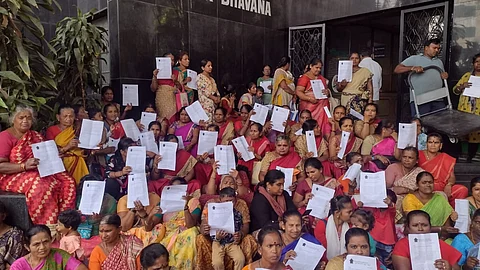

Follow TNM’s WhatsApp channel for news updates and story links.
The Karnataka government has prepared a draft Karnataka Domestic Workers (Social Security and Welfare) Bill 2025, proposing a comprehensive framework to regulate working conditions, provide social security, and protect the rights of lakhs of domestic workers in metropolitan areas across the state.
The draft law aims to bring domestic work—largely unregulated until now—into the ambit of formal labour protections. It sets out mandatory written employment agreements between employers and workers, covering hours of work, wages, benefits, and welfare contributions.
The bill requires all domestic workers, employers, and service providers, including placement agencies and digital platforms, to register on a state portal. Unregistered recruitment or employment will be prohibited, and registration will have to be renewed every three years.
Registered domestic workers will be entitled to minimum wages and overtime pay. They will also have the right to reasonable working hours, with a cap of forty-eight hours a week.
Domestic workers will be eligible for weekly holidays, annual paid leave, and maternity benefits.
In addition, they will gain access to social security and welfare schemes, including healthcare, accident compensation, pensions, and educational support for their children. The law also promises protection from forced labour, discrimination, abuse, and sexual exploitation.
A dedicated Domestic Workers Social Security and Welfare Fund will be established to finance these measures. The fund will draw resources from registration fees, a welfare fee of up to five percent of wages to be paid by employers or agencies, grants from the state and central governments, and penalties and fines. It will be used to support medical expenses, pensions, accident compensation, funeral assistance, and other welfare measures.
The bill provides for the constitution of a tripartite State Domestic Workers Social Security and Welfare Board, with equal representation from government officials, domestic workers, trade unions, employers, and resident welfare associations. The Board will oversee welfare schemes, inspections, and grievance redressal. District-level committees will also be set up to handle disputes between workers, employers, and agencies.
Employers and agencies that fail to register, pay minimum wages, or comply with the Act may face imprisonment of up to six months and fines of up to Rs 50,000. Severe offences such as employing child workers, trafficking, or abuse will attract jail terms of three to seven years and higher fines.
The law also proposes district grievance committees to resolve disputes related to employment, termination, or welfare contributions. However, cases under the Prevention of Sexual Harassment of Women at Workplace Act, 2013 will continue under the existing framework.